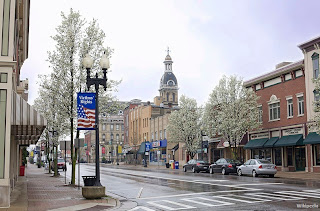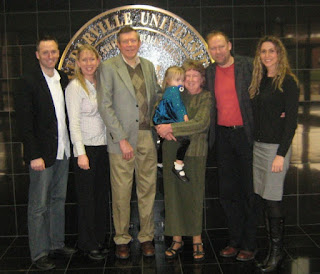The understanding that humans are morally and ethically responsible to exercise dominion and stewardship of the Earth is rooted in Genesis 1 and 2, and affirmed throughout the Scriptures.
We understand from Scriptural revelation that humans are unique among creatures as God’s image-bearers who are morally nurtured by a social framework based upon heterosexual marriage, family, corporate worship, and government (Genesis 2; Romans).
Stewardship of creation is fundamental to these social obligations according to Scriptural teachings on the observance of Sabbaths for the land and for humans; tithes and offerings; love for neighbor; and responsible treatment of animals.
Today, there appears to be a lack of moral consensus in matters related to love of God and neighbor, and it is linked to a similar confusion regarding our responsibility as stewards of the Earth. Therefore, those of us who emphasize the importance of stewardship of the creation (i.e. conservation of land, resources, and biodiversity) increasingly face audiences that do not recognize their moral responsibility toward their Creator or His creation. Environmental stewardship and evangelism are not separate options; but instead, are intricately linked within the sphere of our moral responsibility toward God, neighbor, and community (See “Christians and Climate Change”)
Consider David Brooks’ September 13 column in the New York Times entit led “If It Feels Right….” In it, Brooks reviews a 2008 survey by Christian Smith, a Notre Dame sociologist, and his colleagues. The survey is based on interviews of 230 young Americans, ages 18-23, to examine the emergence of their awareness of and basis for making moral choices. As reported in their book, Lost in Transition: The Dark Side of Emerging Adulthood, young Americans no longer forge their understanding and commitment to moral choices in the context of community. Instead, according to Brooks, “Smith and company found an atmosphere of extreme moral individualism—of relativism and non-judgmentalism.”
led “If It Feels Right….” In it, Brooks reviews a 2008 survey by Christian Smith, a Notre Dame sociologist, and his colleagues. The survey is based on interviews of 230 young Americans, ages 18-23, to examine the emergence of their awareness of and basis for making moral choices. As reported in their book, Lost in Transition: The Dark Side of Emerging Adulthood, young Americans no longer forge their understanding and commitment to moral choices in the context of community. Instead, according to Brooks, “Smith and company found an atmosphere of extreme moral individualism—of relativism and non-judgmentalism.”
For example, one interviewee explained why she didn’t cheat to improve her grades: “I don’t know, I guess I want to be proud of my achievements and proud of what happened, and I want to feel like I had full control of the outcome, I think.” For her, and a growing number of “emerging adults” according to survey results, moral choices are viewed as a matter of individual taste. “It’s up to the individual. Who am I to say?”
To provide context to their assessment of “emerging adulthood” in America, Smith et al describe six “microsocial changes” that have combined to forge the development of a “new phase in the American life course.” The changes include the expansion of higher education and resultant delay in establishment of a stable career beginning in the post WW II era. This delay in turn was associated with a delay in marriage, thus allowing almost a decade between high school graduation and marriage for youth to explore “life’s many options in unprecedented freedom.” More recently, changes in the global and American economy have replaced the prospects of “stable, lifelong careers” with uncertainties that encourage emerging adults to experiment with career options while avoiding commitments.
Smith et al conclude:
Studies agree that the transition to adulthood today is more complex, disjointed, and confusing than it was I past decades. The steps through schooling, a first real job, marriage, and parenthood are simply less well organized and coherent today than they were in the past. At the same time, these years are marked by a historically unparalleled freedom to roam, experiment, learn, move on, and try again.” The authors describe the stage of “emerging adulthood” as one of “intense identity exploration; instability; a focus on self; feelings of being in limbo, in transition, in between; and a sense of possibilities, opportunities, and unparalleled hope… [but also of]…confusion, anxiety, self-obsession, melodrama, conflict, disappointment, and sometimes emotional devastation.
In concluding his review of Smith and colleagues’ Lost in Transition, David Brooks offers his readers the hope that “emerging adults” will take on more mature “moral horizons” as they enter the work force, marriage, and the influence of social institutions. However, Brooks also cites writers such as Charles Taylor who claims that “morals have become separated from moral sources. People are less likely to feel embedded on a moral landscape that transcends self.” Instead of “the group” serving as the “essential moral unit,” Brooks notes, “…people are led to assume that the free-floating individual is the essential moral unit. Morality was once revealed, inherited and shared, but now it’s thought of as something that emerges in the privacy of your own heart.”
The moral decline in general and a related rise in materialism and abuse of creation are, according to Michael Northcott (The Environment and Christian Ethics, Cambridge, 1996), the result of “the loss of spiritual, moral, and cosmological awareness of our place in the natural order…” However, Christians have the means of acquiring moral grounding and accountability through the divine plan of God revealed in Scripture. The victorious Son of God calls us individually to look by faith to His cross to receive cleansing from sin, atonement with God, and adoption as sons into the body of Christ. Then, as members of the universal and local church, the individual believer has opportunities to grow within a community of believers through the spiritual disciplines outlined in Scripture. Marriage and family are biblical institutions that also function as important parts of God’s plan to provide spiritual nurturing and accountability necessary for moral development. The church made up of strong families provides a source of stability and direction for local communities in which “emerging adults” can practice their steps toward morally and ethically responsible adulthood through roles in marriage, government, commerce, recreation, environmental education, and cultural arts.
Moral transformation within a community restores within the individual what Northcott calls an awareness of his or her “situatedness” within God’s love and moral authority, within the joy of loving one’s self and one’s neighbor, and within a growing sense of the “place” in which his or her community resides with its natural resources, history, and aesthetic beauty deserving of appreciation, respect, and conservation.
According to Dr. Ryan Messmore, founder of the Trinity Forum Academy, “Christians should do a better job preparing the emerging generation for courtship, marriage, and sex. We should be able to talk about these things ¬candidly in the body of Christ. Sadly, in many churches today the larger culture exercises more influence in shaping sexual and familial norms among young people (WORLD, June 18, 2011, Vol. 26, No. 12). Messmore elaborates on the role of local communities of authentic believers in establishing moral authority as follows:
Local congregations can address a wide range of emotional, spiritual, social, material, and financial needs. Beyond providing just money or food, they can offer accountability, discipline, modeling, and a sense of belonging in a supportive community. Similar to families, religious communities and ministries can also address problems at the level of the human heart, the level at which change is often needed to overcome the broken relationships and patterns of behavior that trap individuals in poverty. By pointing people to a source of meaning and purpose in life, these faith-based institutions can foster hope, strength, and perseverance in the face of difficulties.
Timothy Dalrymple, who manages the Evangelical Portal of Patheos.com explains how “intentional communities of believers” are addressing the social fragmentation of families and communities. He states in WORLD (December 04, 2010, Vol. 25, No. 24):
…some American evangelicals are reinterpreting vocation today by emphasizing a call to follow Christ and redeem the world together (all italics mine): Vocation is less a profession than a purpose pursued through our careers but also through the common life we share. Thus in urban centers such as Boston, New York, and Chicago, many evangelicals live in intentional communities. They share homes, buildings, or neighborhoods. They try to form enduring relationships and a healing presence within a community.
Shouldn’t our churches be “intentional communities” of believers regardless of geographic location? Communities that nurture morally healthy individuals, families, and government? Communities which become aware of their “sense of place” as expressed in a commitment to wise use of material resources, management of “waste”, and respect for the land and creatures? If you are aware of one or more “intentional communities” and ways that they apply moral values, I’d love to hear from you.
We have outlined factors that have contributed to the current moral climate and considered the essential role of church and community in reversing the decline in moral development. Finally, because stewardship of the environment is a moral and ethical issue, we can see that an environmental stewardship ethic within individuals can only be instilled in the context of a morally vibrant community that is aware of its “place” and purpose in the divine plan. I hope to pursue these ideas further with the intention of being salt and light in the physical and moral community to which God leads my wife and I during the next chapter of lives.
 Having set these priorities, we are now learning the
truth of 1 Thessalonians 5:24, Faithful
is He who calls you, and He also will bring it to pass. For example, only 16 days after the beginning
of John’s retirement, or better, redirection, in August, one of our parents, Abby’s mother
Marietta Moser, suffered a stroke that left her unable to use her left
side. Since then, we have been working
as partners committed to assisting Abby’s six sisters in a rotation that
has allowed us to be with "Mom Moser" in her recovery 24/7, first at Mercy Medical
Center in Canton, then at Carroll Health Center in Carrollton, and now at her
home in Kilgore. Though it is challenging,
we count it a privilege to serve “mom” and to encourage her in her faith at
this time of need.
Having set these priorities, we are now learning the
truth of 1 Thessalonians 5:24, Faithful
is He who calls you, and He also will bring it to pass. For example, only 16 days after the beginning
of John’s retirement, or better, redirection, in August, one of our parents, Abby’s mother
Marietta Moser, suffered a stroke that left her unable to use her left
side. Since then, we have been working
as partners committed to assisting Abby’s six sisters in a rotation that
has allowed us to be with "Mom Moser" in her recovery 24/7, first at Mercy Medical
Center in Canton, then at Carroll Health Center in Carrollton, and now at her
home in Kilgore. Though it is challenging,
we count it a privilege to serve “mom” and to encourage her in her faith at
this time of need.














